8A Revision Chapter 3
8A Unit 3Revision
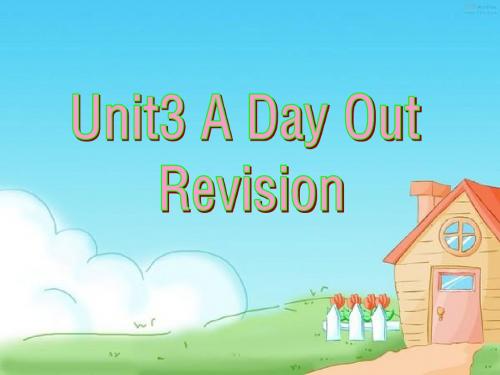
一、用and, but或or填空: 1. Use your head, ________ you will find a way. and 2. It was very late, ________ they still went on working. but 3. Which do you like best, yellow, blue, ______ white? or 4. He can’t read ________ write them in English. or 5. The boy is very young, ________ he can carry the but heavy box. 6. The sky was blue ________ everything was beautiful. and
注: instead of用于句中,本题后接动词, 动词用-ing形式。
2) I don’t like swimming. I like skating _______. instead
注: instead单独使用,后面不接其他成分。
Topic 3 Grammar
1. “ and”, “but” and “or” 2. “ to” infinitives 3. Reflexive pronouns
7.Why don’t we go to Beijing Amusement Park? 征求别人意见时,可用以下句型: Why not do… Why don’t we/ you do… Shall we do … What/ How about doing… e.g. 我们打篮球,好吗? Why not _________ play basketball? Shall ______ we play basketball? _________________ playing basketball? What/ How about _____ don’t we _______ basketball? Why play
英语牛津译林八上Unit3教案(全单元)
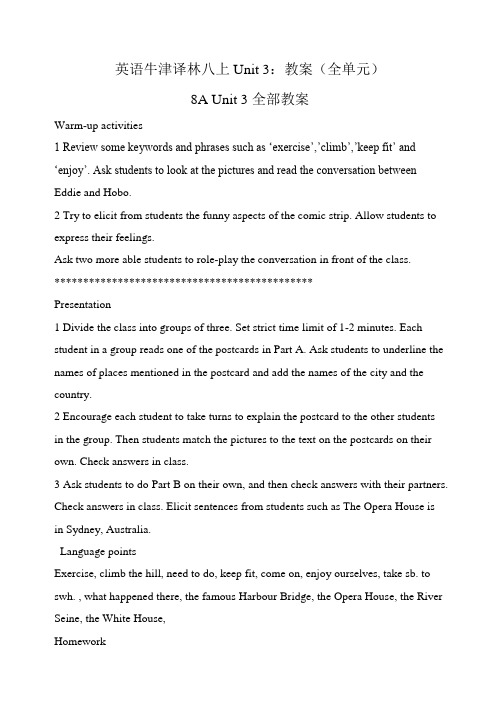
英语牛津译林八上Unit 3:教案(全单元)8A Unit 3全部教案Warm-up activities1 Review some keywords and phrases such as ‘exercise’,’climb’,’keep fit’ and‘enjoy’. Ask students to look at the pictures and read the conversation between Eddie and Hobo.2 Try to elicit from students the funny aspects of the comic strip. Allow students to express their feelings.Ask two more able students to role-play the conversation in front of the class.*********************************************Presentation1 Divide the class into groups of three. Set strict time limit of 1-2 minutes. Each student in a group reads one of the postcards in Part A. Ask students to underline the names of places mentioned in the postcard and add the names of the city and the country.2 Encourage each student to take turns to explain the postcard to the other studentsin the group. Then students match the pictures to the text on the postcards on their own. Check answers in class.3 Ask students to do Part B on their own, and then check answers with their partners. Check answers in class. Elicit sentences from students such as The Opera House isin Sydney, Australia.Language pointsExercise, climb the hill, need to do, keep fit, come on, enjoy ourselves, take sb. to swh. , what happened there, the famous Harbour Bridge, the Opera House, the River Seine, the White House,Homework1 Learn the language points by heart.2 一课三练P.253 Preview the Reading Part.****************************************************Revision1 Review key vocabulary according to the general ability of the class. Presentation (Reading A)1 Show the pictures of the World Park in Beijing. Elicit the names of the places or building.2 Explain to students the context of the letter. Ask Who’s writing the letter? Who’s Linda? Who’s she writing to?3 Read the letter to the class while students follow in their books. Try to read with expression.4 Divide the class into groups of three and allocate one part to each group. Ask them to find adj., verbs or phrases in the letter, which describe how Linda felt that day. They can either underline the words they do not know or write them on a piece of paper. Then go through the words students have underlined.5 Ask students in each group to go through the three sections in Linda’s letter and discuss the different feelings expressed in it.3 Ask students to write a schedule of the day out indicating places and movements only. Ask them to list the key words.6 Check students’ understanding. Ask comprehension questions.**********************************************Presentation (Reading B)1 Ask students to read the conversation on their own.2 Ask students to replace the underlined phrase with the correct words. Encourage less able students to find the words in the letter on page 36&37.3 Ask students to compare answers in pairs. Then ask two students to read out the conversation in class to check the correct answers.4 Ask students to write the list of new words and definitions in their vocabulary record books.5 Divide the class into pairs and ask them to read the conversation.**********************************************Presentation (Reading C)1 Do Part C as a class competition.2 Ask students to close their books . Then read the sentences at random one at a time. Write them on the Bb only one at a time. Make it clear that students raise their hands when they are ready to answer.3 Ask students to correct the false sentences. Allow less able students to open their books and find the correct information.4 Talk to students about a home page to focus their attention on Part C2. Then ask them to sequence the pictures on Daniel’s home page on their own.5 Check answers as a whole class activity.6 Ask students if there are any disagreements. Encourage them to explain why they have selected a certain sequence in order to identify reasons for mistakes. Language points (Part A)Invite sb. to do, at the beginning, get on a coach, be boring, on the highway, feel sick, most of the trip, arrive at, be made of metal, in front of, places of interest, from all over the world, the real ones in Egypt, an amazing day, join in, teach himself, a home page, for everyone to look atLanguage points (Part B)Travel from one place to another, movement of cars, the main road, come up from your stomach, the tall metal building, the old stone buildingLanguage points (Part C)It takes sb. time to doHomework1 Learn the language points by heart.2 一课三练P.26-273 Preview the Vocabulary Part.****************************************************** Presentation (Vocabulary)1 Part A is a recognition task asking students to identify the English names of popular places of interest in Beijing. Bring in photos of these places.2 Explain the context of the tasks. Ask students to study the pictures and words.2 Ask students to check answers with a partner. Then check the correct answers with the whole class by asking individual students to read out the sentences.3 Part B is a problem-solving task and students need to use their existing knowledge of Beijing to do it. Bring in a map of Beijing.4 Revise means of transport by asking students how they go to school or work.5 Ask students to do the task in pairs. Then ask students in a pair to compare their answers with another pair. Then ask students to take turns to read the sentences aloud to check the correct answers.Language pointsThe Monument to the People’s heroes, the red maple leaves, walk slowly around the big lake, feel the beauty of…, the names of the transport, more than an hour. Homework1 Learn the language points by heart.2 一课三练P.283 Preview the Grammar Part.************************************************Presentation (Grammar Part A)1 Elicit from students the context illustrated in the picture.Focus students’ attention on the trip and how the Class 1, Grade 8 students felt at the time. E.g., How was the trip? (boring, too long) Then ask them to form sentences with the keywords and write them on the Bb. E.g., The trip was boring. It was too long. Ask them to join the two ideas in one sentence.2 Ask students to list other similar ideas about the journey using ‘and’.3 Ask students to combine the two contrasting ideas--- of a boring trip on the coach and a wonderful day. Ask them when we use ‘and’ and ‘but’ to elicit the rulers.4 Ask students to combine the two options.5 Elicit a few sentences from students’ own experiences, focus on the sentences with the same subjects and verbs.6 This is a deductive learning activity. Encourage students to work it out as a problem-solving task following a set sequence of deduction. Students should be able to work out the correct joining word and also which words to delete by applying rules on Page 41.7 Elicit feedback from the class. Ask students to read out their new sentences. The others listen carefully and express agreeme nt or disagreement. If there’s any disagreement, encourage students to explain their reasons to help them focus on the different details of the rule.********************************************Presentation (Grammar Part B)1 Read the sample sentences. As k students to identify the verb and the ‘to’-infinitive in each sentences.2 Elicit other verbs that are usually used with ‘to’-infinitive. Give them the extra examples listed on page 43.3 Ask students to complete ‘Work out the rule!’ at the bottom of the page. For less able students, tell them to go through the example sentences and the explanations again.4 Ask students to complete the conversation in pairs. They should make sense of the sentences before they select a verb. Remind less able students that they need to use ‘to’-infinitives in the conversation.6 Ask students to read the conversation in pairs. Ask a pair of more able students to read out the conversation to the class.**************************************************Presentation (Grammar Part C)1 Write down some sentences containing reflexive pronouns. You can use the following examples:* I fell over and hurt myself.* My baby sister can feed herself.* My cat cleans itself every day.* We found ourselves in the centre of the city.2 Underline the reflexive pronouns in the sentences. Explain the use of reflexive pronouns. Tell them we use them when the subject and the object are the same person or thing.3 Explain the difference between reflexive and personal pronouns by giving some examples.4 Go through the table. Make sure students are able to distinguish between the singular and plural forms.5 Write some more verbs, e.g., ‘teach’, ‘give’, ‘buy…for’,’ look after’,etc.6 Ask students to complete ‘Work out the rule!’ at the bottom of the page.7 Explain the context and tell students that they need to find out Linda and Simon’s secret. Ask students to read the cartoon story first without working out the correct reflexive pronouns. Check the understanding of the vocabulary.8 Then ask students to go through the story again and work out the correct reflexive pronoun for each blank.9 Ask more able students to read out the speech bubbles in sequence. The rest of the class should listen carefully and check their answers.Language pointsDecide to do, prepare to do, see the sunset, take some photos of it,climb the rocks, hide-and-seek, pull himself up, luckily, do not tell anybody about this, keep their secret to themselvesHomework1 Learn the language points by heart.2 一课三练P.29-303 Preview the Integrated skills Part.************************************************Presentation (Integrated skills A)1 Talk to students about different school events. Elicit from students names of such events, e.g., a sports day, a funny day, a school fair, etc.2 Set the context of organizing sports, music, drama or any other events involving competition.3 Briefly review language required for a schedule using your students’ own experience. Use information based on the school. Write some details on the Bb.4 Read the poster in pairs. Ask some questions to find out the main points, e.g. , What’s it about? Who is it about? What will happen? Where will it happen? When?4 Ask students to look at Kitty’s notes and complete as much of the schedule as possible on their own. Encourage them to find the answers in the poster and underline them.5 Play the recording for Part A2 and ask students to complete the rest of the notes on their own.Play the recording again so that Ss are able to check, confirm or change their initial responses.6 Ask more able student to read the completed notes to the whole class to check answers .7 Present Part 3 as a quiz reading the sentences one by one. Ask more able student to rewrite the false statements with the correct details.Presentation (Integrated skills B)1 Ask students to practice the conversation in pairs and then change roles.2 Close the books and listen to me while I read the conversation. Ask students to repeat the sentences as they hear them.3 Encourage Ss to memorize the sentences. Ask them to pretend they are talking on the phone.4 Ask Ss to work in pairs and use the conversation as a model to make suggestions about visiting a place, express their opinions and make arrangements.Language pointsTh e final of…, take place, cheer for our team, with your support, we will win,half-time, presentation of cup and medals, per person, cost of the trip, over an hour, Shall we go to the Great Wall?, I’m afraid…, Why don’t we…?, play hide-and-seekHomework1 Learn the language points by heart.2 一课三练P.313 Preview the Study skills, Main task & Checkout Part.****************************************************** Presentation (Study skills)1 Make Ss aware of the difference between facts and opinions. Ask more able students what is a fact and what is opinion.2 Ask students to read the leaflet about the World Park.3 When they are comparing their answers, ask them to underline the words which express opinions and personal feelings.Language points (Study skills)467,000 square metres in areaPresentation (Main task)1 Introduce the topic of planning a day out. Ask Ss to bring in brochures of local places which they would like to visit.2 Elicit from Ss the need for accuracy in terms of times, dates, transport, places and types of activities.3 Remind students the context of this section. Go through the plan in Part A and point out the information which Kitty and Daniel want to include in the invitation letter.4 Tell Ss that the model plan prepares them for writing an invitation letter with their own information and details.5 Ask students to go through kitty and Daniel’s letter quickly and complete it on their own.6 Direct Ss’ attention to the different parts of the letter. Ask students to cover the prompts on the left. Ask them to match them with the corresponding parts in kitty and Daniel’s letter.7 Ask students to write a rough draft using the plans they have prepared in Part B. Language points (Main task)Is coming to visit you, all the way to…,************************************************Presentation (Checkout)1 Revise the use of joining words, reflexive pronouns and verbs +to infinitives.2 Ask students to read through the conversation and complete the sentences.3 Check the correct answers with the whole class and tell them to write their scores in the paw.4 Ask Ss to look at the pictures in Part B and explain the context. Ss then write the names of the places on their own.Language points (Checkout)Planned to go, pack my bag instead, play badly, shuttle bus, go climbing on rocks Homework1 Learn the language points by heart.2 一课三练P.32-343 Preview the Unit 4.。
8A Unit3 Revision

15. 保持健康
16. 一百多个学生
17. 不敢相信自己的眼睛 can’t believe one’s eyes
18. 美国总统
19. 不再 20. 乘长途汽车 21. 世界公园 22. 小心
the president of the USA
not… any more/no more take a coach the World Park take care= be careful
Tian’anmen Square
• It’s the greatest square in China. • The Monument to People’s Heroes is in the center of the Square.
Wangfujing Street
• A famous street in Beijing • Visit the big shops
The Summer Palace
Walk slowly around the big lake Feel the beauty of the old park
How do they get there?
1.A: They will visit the Palace Museum this afternoon. By underground B: How will they get there? _______________ (乘地 铁)? by coach A: No, They will go there __________ ( 乘旅游汽车). 2.A: Let’s go and see the Monument to the People’s Heroes, shall we? by taxi B: That sounds great. Will they go there ______ (坐 出租车)? take the underground A: I think they can __________________ ( 乘地铁).If they ___________( 坐出租车) there, that will cost them take a taxi a lot. 3. A: It’s Sunday tomorrow. Linda and Kitty are going to Wangfujing Street to go shopping. B: What great fun! They may go with us if they like . My father will go there_______________(开车) . by car
8A Writing revision(Unit 4-Unit 6)

3. How did you feel?
1). frightened/excited/terrible/in fear /worried/sad--2). screamed/shouted/calmed down/happy/thankful (感激的) --4.You can use these words to describe: First, Then, Next, Finally/At last
How to write an article about a natural disaster
Choose the topic
A fire An earthquake A flood A rainstorm A typhoon A snowstorm A sandstorm
Choose a topic introduction
How to write a report on an endangered animal?
Title: _________ are in danger!
Paragraph 1 Paragraph 2 Paragraph 3 Paragraph 4
Paragraph 5
Appearance Ability Character Danger
flood
earthquake
typhoon
drought
lightning
fire
snowstorm
中国首家新课标免费资源网(不必注册,免费下载)
请记住我们的网址:
tornado
tsunami
rainstorm
mud-rock flow
sandstorm
Blue whales are in danger! Blue whales are the biggest animals in the world. Their bodies are blue or gray. Their backs have small light stripes. Their heads are small and flat. There are two spouts on the top of each head. Their mouths are big but there is no tooth in the mouths. They are 2400 to 3400 cm long and weigh about 150 million - 200 million grams, almost 2000-3000 people’s weight. Blue whales are good at swimming because they live in the sea. They are also good at hunting. They all like to swim around the sea.
牛津译林版八年级英语上册8A Unit 3 单元教案
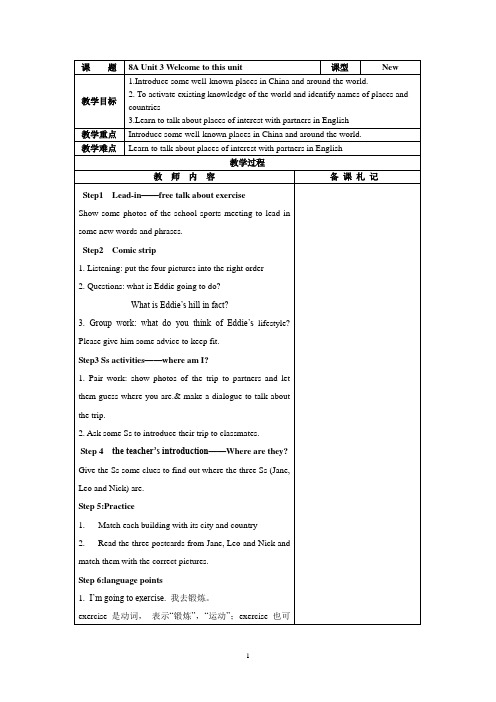
课题8A Unit 3 Reading (1) 课型New教学目标1 .To guess meaning from pictures2 .To infer general meaning from context and keywords3. To respond to text by sequencing information教学重点To infer general meaning from context and keywords教学难点To respond to text by sequencing information教学过程教师内容备课札记Step1 Lead inDiscussion:If you want to travel around the world in aday, what can you do?Step 2 Presentation1) Introduction of the world park2) Some new words and phrases:the Golden Gate Bridge boring a lot of traffic bequite far awayStep 3 Fast reading1) What is the letter from Linda to her parents about?2) What did Linda think of the trip?Step 4 Careful reading1) Fill in the table below:A trip to the World Park in BeijingWhoWhenHow(transportation)How farWeather2)Find out the route of the tripon the way at the World Park inside the park3) Some questionsWhat was the weather like?Where did Linda see the Golden Gate Bridge?Could Linda’s mother see the photos? Why?Step5 Role-playSuppose you are Linda, retell the day out to the World1、Be honest rather clever 22.4.264.26.202204:4004:40:12Apr-2204:402、By reading we enrich the mind; by conversation we polish it.二〇二二年四月二十六日2022年4月26日星期二3、All things are difficult before they areeasy.04:404.26.202204:404.26.202204:4004:40:124.26.202204:404.26.2022 4、By other's faults, wise men correct theirown.4.26.20224.26.202204:4004:4004:40:1204:40:125、Our destiny offers not the cup of despair, but the chalice of opportunity. So let us seize it, not in fear, but in gladness. Tuesday, April 26, 2022April 22Tuesday, April 26, 20224/26/20226、I have no trouble being taken seriously as a woman and a diplomat [in Ghana].。
8Aunit3-4

8A Unit 3—4 Revision一. 单项选择( )lie found _______difficult to play the piano well.A. it’sB. itC. thatD. this( )2. Thank you for _______ let me _______ fishing with you today.A. agreeing; goB. agree; goC. agreeing to; goD. agree to; go ( )3. China is a big country ________ a long history.A. andB. butC. hasD. with( )4. No one taught ________ English. He learned it _________.A. him; by himselfB. his; by himselfC. him; himselfD. his; by himself ( )5. The trip _______ about 3 hours from the school to the park.A. costB. usedC. spentD. took( )6. There ________ a lot of traffic in the daytime.A. areB. isC. are goingD. will have( )7. Tom arrived _______a warm spring morning.A.atB. onC. inD. by( )8. He told Tom _______ read in the sun because it was bad for his eyes.A. toB. doesn’tC. not toD. to not( )9. He always thinks more of ________ than of _______.A. him; otherB. the other; himC. hims elf; the otherD. others; himself ( )310. Why ________ come to school earlier?A. not toB. notC. don’tD. don’t to( )11.His computer doesn’t work. So he bought a new_____A.itB.oneC.themD.anothet( )12.—Can you help me with the bike?---Sorry , it______, “Do it your self”A.speaksB.talksC.tellsD.says( )13.He always ________the instructions on the bottle.A.readsB.looks atC.watchesD.sees( )14.---Can you help me repair my bike? ---- _______.I am coming.A.Of course notB.Thank youC.No problemD.You are welcome ( )15.The room is _____with lots of people.A.fillB.filledC.fullD.fulled( )16.His father advised me _____it again.A.tryB.tryingC.to tryingD.to try( )17.You had better_____talk in class without permission.A.notB.don’tC.noD./( )18.You______tell him the result right away.A.should notB.should not toC.should to notD.not should( )19.It’s raing. You’d better stop_____A.workingB.to workingC.to workD.work( )20.Not only the students but also the teachers_______early in this school.A.get upB.gets upC.getting upD.are getting up二、词汇A. 根据句意及首字母或汉语提示完成句子1. Thanks for __________ (同意) to let me watch the match on TV.2. The city streets are full of (来往车辆).3. Xi Jinping is the ______________(国家主席) of China.4. The children took a boat ________________(旅行) along the Yellow River last Sunday.5. We had to move (里面)when it started to rain.6. I’m p________ for the trip to Guangzhou. It will cost a lot of money.7. The teacher w__________ who broke the window.8. Our team w________the basketball match f inal today.9. He stayed at home and watched TV i___________of goin g out to play with his friends.10.There was t________ snow last week and all the ground was white.11.______________(几乎) no one here can answer my question.12.What_____________(工具) should I use to plant the tree?13.The books on this ___________(架子) are all about science.14.O__________ there was a boy called Tom who told me the story.15.My teacher a__________ me to buy a dictionare.16.When will you a_________the meeting? Next Monday afternoon.17.I don’t know the word. So I can’t __________(拼) it.18.LiLi’s father is ill, I will look after him, i________B 用所给词的适当形式填空19. Thank you very much for keeping the secret to ________________(you).20. _______ (lucky), he didn’t catch the last train to Shanghai.21. When you walk slowly around the lake, you can feel the _______(beautiful) of this city.22. He writes ___________ (care) in his class.15. Yesterday he ________ (drive) to his office, but this morning he _____ (ride) there.23. They listened to some music at the ________(begin) of the meeting.24. The scientists told us some stories about _________(amaze) UFOs .25. It’s _________(real) fun to learn foreign languages.ually I can’t read the map____________(correct).27.I like eating ______________(tomato) because they are healthy fro health.28.They now have a blue____________(live) room.29.I look thin, but he looks even __________(thin).30.The boy is too young to look after _____________(he) .三. 完形填空Years ago, my friend and I went to the Caribbean. We stayed at the Winding Bay Hotel first.The owner of the hotel, Mr Emeritus, was nice and was always __1__ to help others. A few days later, we were planning to sta y for four days at the Cable Beach Hotel at another place. Mr Emeritus told 2 that he knew the owner of it. He gave us his 3 and told us to give it to the front desk when we got there. We thought that we might receive a fruit basket or something like that, because the 4 knew each other.5 we arrived at the Cable Beach Hotel, I gave the card to the front desk. The man6 us up to our room. We enjoyed our time at the hotel. When we would leave, the man told us we only needed to7 one phone call. I told him that he made a mistake. However, he told us that Mr Emeritus paid for everything else. We were so __8__.After we returned home, we sent a letter to the owner and thanked him for making our 9 memorable (难忘的). For years, we kept 10 Christmas cards to him, and he sent them to us, too!( )1. A. hard B. ready C. honest D. true( )2. A. us B. you C. them D. him( )3 A. money B. number C. card D. address( )4. A. hosts B. hotels C. waiters D. owners( )5. A. When B. Before C. If D. So( )6. A. taught B. took C. caught D. carried( )7. A. look for B. wait for C. pay for D. ask for( )8. A. frightened B. general C. popular D. surprised( )9 A. taste B. advice C. trip D. practice( )10. A. buying B. sending C. wanting D. hoping四.根据中文提示完成句子1.你知道这个标记代表什么吗?Do you know what this sing______ ________?2.别痴迷于玩电脑游戏。
牛津译林8A_Unit3_Revision复习课件
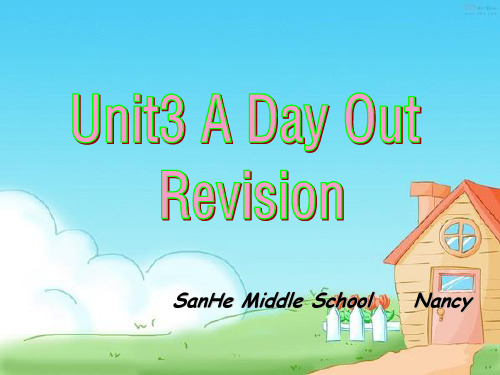
7. At the _b_e_g_in__n_in__g_(begin), we all felt bored.
8. Remember to send our g__re_e_t_i_n_g_s(greet) to
your family.
9. There is too much __t_ra_f_f_ic__ (movement of cars) on the road every day.
12. When did you r_e_c_e_iv_e____ the postcard ? 13. I enjoyed the b_e_a_u_ty___ of the old park in
the Summer Palace. .
14. The Eiffel Tower is made of m_e_t_a_l ___. 15. I w_o_n_d_e_r__ where to spend this weekend. 16. The children are c_h_e_e_ri_n_g__ for their
then we can go to Wangfujing Street
_b_y_ underground.
by引导交通方 式用于句末, 且前面有动词。
1. A: They will visit the Palace Museum this afternoon. B: How will they get there? __B_y__u_n_d_e_r_g_r_o_u_n_d (乘地铁)? A: No, They will go there __b_y_c_o_a_c_h__ ( 乘长途汽车).
2. A: Let’s go and see the Monument to the People’s Heroes, shall we?
牛津8Aunit3Revision
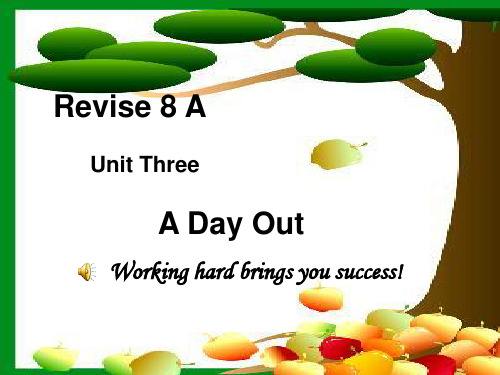
202.0g.你o 自an己d去se看e for
1177..c不a相n’信t我be的li眼ev睛e my
yourself
eyes
牛津8Aunit3Revision
翻译词组: 1. 发生 2.进入决赛 3.旅行的花费 4. 在…的最后 5.为我们队加油
take place go to the final cost of the trip at the end of … cheer for our team
3.Look! The students are _c_h_e_e_r_in_g_ (喝彩) for their basket team.
4.We want to travel toA_u_s__tr_a_l_ia(澳大利亚)
5. The President(总统) of the USA was Bill Bush in 2008.
6. There were lots of foreign (外国的) travelers in Beijing in 2008.
牛津8Aunit3Revision
7.This is a __w_i_d_e_______ (宽的) street and five cars can go through it together.
missed the bus.
牛津8Aunit3Revision
牛津8Aunit3Revision
1. keep fit
2. as high as
3. come on
4. enjoy oneself
5. go/walk/run/drive past
6. be made of/from
7.need to exercise
八年级英语上册ChapterOne—ChapterThree语法重难点复习牛试题
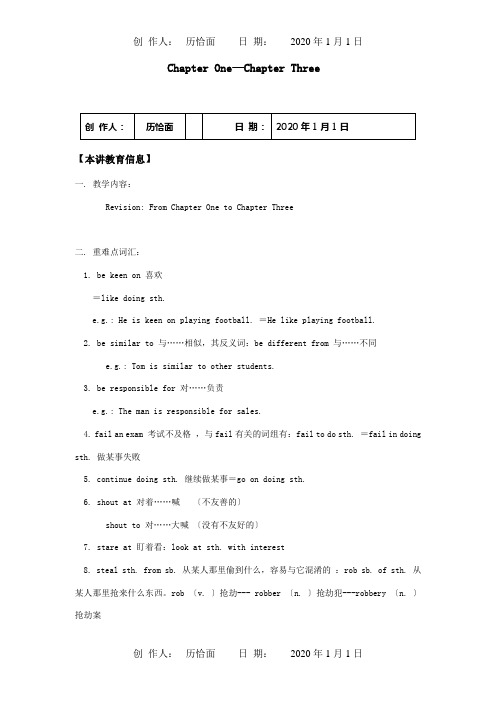
Chapter One—Chapter Three【本讲教育信息】一. 教学内容:Revision: From Chapter One to Chapter Three二. 重难点词汇:1. be keen on 喜欢=like doing sth.e.g.: He is keen on playing football. =He like playing football.2. be similar to 与……相似,其反义词:be different from 与……不同e.g.: Tom is similar to other students.3. be responsible for 对……负责e.g.: The man is responsible for sales.4. fail an exam 考试不及格,与fail有关的词组有:fail to do sth. =fail in doing sth. 做某事失败5. continue doing sth. 继续做某事=go on doing sth.6. shout at 对着……喊〔不友善的〕shout to 对……大喊〔没有不友好的〕7. stare at 盯着看:look at sth. with interest8. steal sth. from sb. 从某人那里偷到什么,容易与它混淆的:rob sb. of sth. 从某人那里抢来什么东西。
rob 〔v. 〕抢劫--- robber 〔n. 〕抢劫犯---robbery 〔n. 〕抢劫案9. be afraid of sth. 害怕……与此相关的词组:be afraid of doing sth. 害怕做某事be afraid to do sth. 担忧做某事这两个词组有时可以相等,但是有时不能交换。
e.g.: I am afraid of going out at night. 不能说成 I am afraid to go out at night.10. hope to do sth. 希望做某事hope+that 从句 e.g.: I hope you will write to me soon.注意:绝对不能用 hope sb. to do sth.希望某人做某事可以说成:expect sb. to do sth.三. 重点句子:1. I am about five feet tall. 我大概有五英尺高。
Unit8Revision(通用5篇)
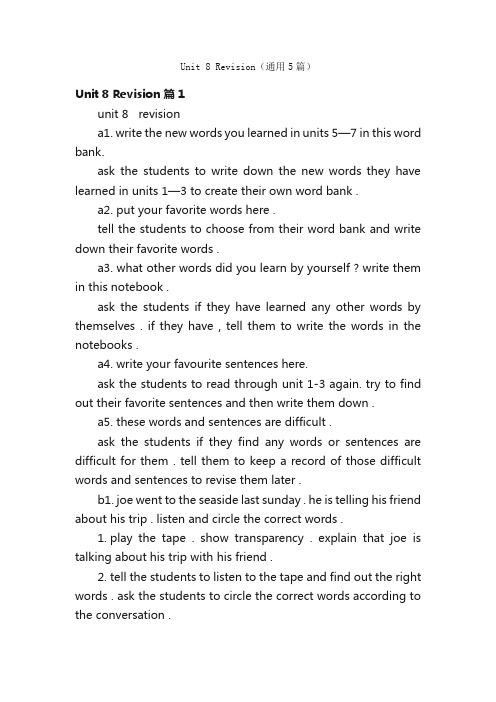
Unit 8 Revision(通用5篇)Unit 8 Revision 篇1unit 8 revisiona1. write the new words you learned in units 5—7 in this word bank.ask the students to write down the new words they have learned in units 1—3 to create their own word bank .a2. put your favorite words here .tell the students to choose from their word bank and write down their favorite words .a3. what other words did you learn by yourself ? write them in this notebook .ask the students if they have learned any other words by themselves . if they have , tell them to write the words in the notebooks .a4. write your favourite sentences here.ask the students to read through unit 1-3 again. try to find out their favorite sentences and then write them down .a5. these words and sentences are difficult .ask the students if they find any words or sentences are difficult for them . tell them to keep a record of those difficult words and sentences to revise them later .b1. joe went to the seaside last sunday . he is telling his friend about his trip . listen and circle the correct words .1. play the tape . show transparency . explain that joe is talking about his trip with his friend .2. tell the students to listen to the tape and find out the right words . ask the students to circle the correct words according to the conversation .3. check the students’ answers .b2. yesterday was “bring your child to work” day. jen and ron are talking about what they did yesterday .listen and put tick or cross in each box .5. play the tape . show transparency. tell the students that the children went to their parents’ workplaces yesterday and did different things there .6. then tell the students to listen to the tape and make choices.7. ask the students to fill in the blanks with the correct words .8. ask one or two students to read their answers to check with the whole class .c. here is a poster for animal land . read , look at the pictures and act .4. show transparency. ask the students to look at the picture and the incomplete dialogue .5. explain to the students that the children are talking about what they did at animal land .6. ask the students to role- play the conversation according to the pictures .d1. ken is writing about and match his trip to australia . read his letter . then write t for true or f for false after each sentence.1. show transparency. tell the students to read ken’s letter about his trip to australia .2. ask the students to read the sentences below the letter and tell them some sentences are correct and some are not .3. use transparency to check the students’ answers.d2. read this story and match the pictures and the words .1. show transparency. tell the students to read the story and look at the pictures.2. ask the students to match the pictures and the words by writing the correct letter in each box .3. use transparency to check the students’ answers.e1. tim is reading a letter from his cousin. the letter got wet and some words are missing . read the letter and finish it .1. show transparency. tell the students to read the letter carefully and explain that the letter is not complete .2. ask the students to fill in the blanks .3. use transparency to check the students’ answers.e2. read this webpage and answer the questions .1. show transparency. tell the students to look at the pictures and read the passage carefully .4. ask the students to answer the questions using the information in the passage.5. ask one or more students to read aloud their sentences to check their answers with the whole class .homework :13. copy the words twice .14. copy the text .15. recite the words and phrases .Unit 8 Revision 篇2Lesson 31【课题】第六单元 Lesson 31【重点】1.围绕本单元重点句式,针对画面进行充分的问答练习。
8A期中复习练习1 -4
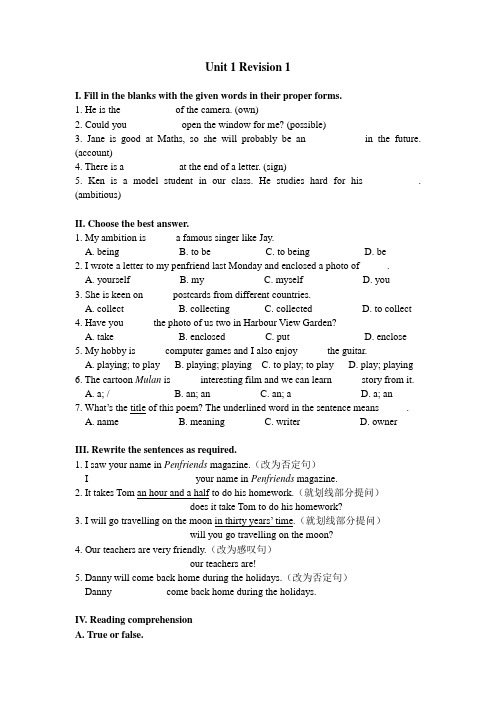
Unit 1 Revision 1I. Fill in the blanks with the given words in their proper forms.1. He is the __________ of the camera. (own)2. Could you __________ open the window for me? (possible)3. Jane is good at Maths, so she will probably be an __________ in the future. (account)4. There is a __________ at the end of a letter. (sign)5. Ken is a model student in our class. He studies hard for his __________. (ambitious)II. Choose the best answer.1. My ambition is _____ a famous singer like Jay.A. beingB. to beC. to beingD. be2. I wrote a letter to my penfriend last Monday and enclosed a photo of _____.A. yourselfB. myC. myselfD. you3. She is keen on _____ postcards from different countries.A. collectB. collectingC. collectedD. to collect4. Have you _____ the photo of us two in Harbour View Garden?A. takeB. enclosedC. putD. enclose5. My hobby is _____ computer games and I also enjoy _____ the guitar.A. playing; to playB. playing; playingC. to play; to playD. play; playing6. The cartoon Mulan is _____ interesting film and we can learn _____ story from it.A. a; /B. an; anC. an; aD. a; an7. What’s the title of this poem? The underlined word in the sentence means _____.A. nameB. meaningC. writerD. ownerIII. Rewrite the sentences as required.1. I saw your name in Penfriends magazine.(改为否定句)I __________ __________ your name in Penfriends magazine.2. It takes Tom an hour and a half to do his homework.(就划线部分提问)__________ __________ does it take Tom to do his homework?3. I will go travelling on the moon in thirty years’ time.(就划线部分提问)__________ __________ will you go travelling on the moon?4. Our teachers are very friendly.(改为感叹句)__________ __________ our teachers are!5. Danny will come back home during the holidays.(改为否定句)Danny __________ come back home during the holidays.IV. Reading comprehensionA. True or false.Half a year before graduating from college, my friend, Joe, began to look for a job and soon got an interview. There were only three people for the final interview. The interview was very simple. The interviewer only chatted with them for a while during it. At last the interviewer said to them, ―All of you are very good. Please go home and wait for our reply.‖Three days later, Joe received a message from the company. It said that he had not been offered a job. Joe felt upset. But later in the evening he told me that he had received another message. It said that he had been employed by the company.Actually the first message sent to Joe was also part of the test in the interview. The three men received the same message, but only Joe’s reply satisfied the company, so he was given the job. I asked Joe, ―How did all of you reply?‖ Joe said, ―One did not reply, the other said `goodbye’, and I said `thank you’.‖Only then did I know that Joe’s job came in that way. That is, when you feel disappointed, do not forget to say thank you to the one who disappoints you. Saying thank you shows respect for others’ work. Therefore, while under the same condition, you may get more chances compared to others!1. It took Joe a very long time to get an interview.2. The final interview was too hard for Joe.3. Joe and the other two people received the same message at first.4. The other two men didn’t reply to the company when they got the company’s first message.5. Although Joe was upset, he replied to the company’s first message politely.B. Answer the questions.―OK, action!‖ Music starts to play. Female voices sing sweetly. The actors start to dance as a rap starts ―All it takes a little dedication, realization, motivation. Don’t stop! Keep chasing!‖It’s a scene from a short movie called Dreams: The Musicals.What’s special about it? It was written, and is being performed, produced and directed by 18 disabled (残疾的) teenagers.The students from Michigan are filming their movie at a high speed—three weeks from start to finish. They are acting and doing most of the behind-scenes (幕后的) work under the guidance of several professionals.The movie’s theme (主题) is aspiration (渴望). It’s a part of a three-week Michigan summer programme that is funded through donations (捐款).―We are hoping that these teenagers are going to learn skills that they can use later on, when they finish high school,‖ says Ellene Corance, a programme assistant. ―And I have seen great growth in the students.‖It is 15-year-old Sierra Burkes’ first job. Her dream is to become a nurse or a dancer. ―When I first came, I used to be all talking,‖ says Sierra. ― Now I have learnedhow to control my attitude (态度).‖―It’s like a dream that comes true. We are getting experience making movies and videos,‖ says Alphonso Mayberry, 17. ―It’s the experience of having a job and getting real pay. We are learning to work hard.‖ Alphonso says he wants to become a disc jockey (DJ), a police officer or work in a recording studio.Organizers expect the movie to run for about 30 minutes. It will have its first showing at a local theatre. ―I think it will be cool,‖Sierra says. ―It’s going to be exciting. I want everybody to come and see me. I’ll be happy.‖1. What is the title of the movie?_______________________________________2. Why does the writer think the movie is special?_______________________________________3. How much time will they spend filming the movie?_______________________________________4. What has Sierra Burkes learned from filming?_______________________________________5. Where will the movie have the first showing?_______________________________________6. What do you think of these US teenagers?_______________________________________Unit 1 Revision 2I. Fill in the blanks with the given words in their proper forms.1. She always goes out with a pair of __________ in summer. (sunglass)2. A __________ is part of a person’s address. (post)3. Tom is good at every subject except __________. (physical)4. One of my friends is an __________. (engine)5. What is the __________ of the mountain? (high)II. Choose the best answer.1. I am quite keen _____ sports, especially table tennis.A. atB. onC. withD. of2. His job is _____ make people’s teeth healthy.A. helpB. to helpC. helpsD. to helping3. Professor Wang is going to give a report in _____ university this weekend.A. aB. anC. theD. /4. You don’t have to help _____. He can manage to finish it _____.A. him; hisB. himself; heC. his; himselfD. him; himself5. –Do you like English?--Yes. But I think it’s one of _____ of all.A. the most difficult subjectB. the most difficult subjectsC. more difficult subjectD. more difficult subjects6. –_____ did you have the party last night?--In the City Park.A. WhatB. WhereC. WhyD. When7. I hope to hear from my penfriend this weekend. The underlined phrase in the sentence means _____.A. visitB. get a letter fromC. write toD. e-mailIII. Rewrite the sentences as required.1. It’s ten minutes’ ride from my home to school.(就划线部分提问)__________ __________ is it from your home to school?2. My parents came to England about 30 years ago.(就划线部分提问)__________ did your parents __________ to England?3. I want to be an actress.(保持句意不变)My __________ ___________ to be an actress.4. May often goes to the zoo on foot at weekends.(保持句意不变)May often __________ __________ the zoo at weekends.5. Jane is about five feet tall.(就划线部分提问)__________ __________ is Jane?IV. Reading comprehensionA. Choose the best answer.You may feel curious about students in other countries: Do they also have so much homework? What do they do in their spare time?A recent report came out on the lives of high school students in China, Japan, South Korea and the USA. It surveyed around 6,200 students from the four countries last year. You may find the answers to many of your questions in this report.Who studies hardest?Chinese students spend the most time studying. Nearly half of Chinese students spend more than two hours on their homework every day. That’s much more than the students of the US (26.4%), Japan (8.2%) and South Korea (5.2%).Who sleeps most often in class?Japanese students fall asleep in class most often. About 45% of them say they sometimes doze off(瞌睡) in class. In South Korea, it’s 21%; in the US, 21%; and 5% in China.South Korea students don’t like taking notes. About 70% say they write down what the teacher says in class, much fewer than in Japan (93%), China (90%) and the US (89%).Who is the most distracted?American students are the most active in class, but also the most distracted: 64.2% say they chat with friends in class; 46.9% say they eat snacks in class; and 38.9% say they send e-mails or read unrelated books in class.What do they do after school?In their spare time, most Chinese students study or surf the Internet. Most American students hang out with their friends. Most Japanese students do physical exercises. Most Korean students watch TV.1. The recent report surveyed the lives of high school students in the following countries except ____.A. BritainB. JapanC. AmericaD. China2. According to the survey, South Korean students ____.A. spend most time studyingB. spend least time studyingC. enjoy most of their homeworkD. enjoy studying most3. We may know from the survey that ____ in class.A. Japanese students seldom doze offB. Chinese students like to doze offC. South Korean students like taking notes mostD. Japanese students like taking notes most4. The underlined word ―distracted‖ may probably means ―____‖.A. disappearedB. disappointedC. unable to study attentively (专心地)D. unable to think properly5. According to the report, ____ of American students admitted chatting with friends in class.A. 46.9%B. 38.9%C. 64.2%D. 62.4%6. In their spare time, most ____ students have sports in the survey.A. ChineseB. AmericanC. South KoreanD. JapaneseB. Read the passage and fill in the blanks with proper words.The idea of the World MUN (世界学生模拟联合国大会) began in 1991. A group of students at Harvard University wanted to make a new meeting to bring (1)t_____ the students who were interested in the world. They wanted to (2)d_____ different problems around the world. The World MUN is based on understanding, compromise (合作), (3)l_____ and friendship. The first meeting was held in Poland in 1992. After that, it is (4)h_____ in spring every year. Last year, it was held in Scotland. This year it was held in Peking University from March 27th to 31st.This was the (5)f_____ time the World MUN meeting was held in Asia. It was also the (6)b_____ one in history. The students came from the best universities around the world. During the five-day meeting, they did everything that people in the UN do. Though their skin colors and cultures were different, they had the same wish to make the world better.1.t ________2.d ________3.l ________4.h ________5.f ________6.b ________Unit 1 Revision 3I. Fill in the blanks with the given words in their proper forms.1. Taylor Swift is one of the most famous ________ in the world. (act )2. Teachers should speak to their students in a _______ way. (friend )3. My parents are the ________ of the big hotel in Beijing. (own )4. Peter’s ________ subject at school is physics, so now he spends more time on it. (bad)5. Now I’m going to introduce ________ to all of you so that we can know each other. (me)II. Choose the best answer.1. I sometimes play _____ baseball with my classmates after school.A. aB. anC. theD. /2. Ben does _____ in Chinese, but he is not _____ at Maths.A. good; goodB. well; wellC. good; wellD. well; good3. Jim has gone to Beijing to attend a meeting, _____ he hasn’t come to work today.A. thoughB. ifC. soD. until4. To our surprise, we _____ have an 8-day holiday.A. shouldB. canC. mustD. need5. I have a nephew _____ Edward. He works in a famous British bank.A. calledB. callsC. is calledD. calling6. --_____ is it from your school to your home?--About 10 minutes’ walk.A. How longB. How soonC. How farD. How much7. --_____ were you late this morning?--Because I missed the bus.A. WhatB. WhenC. WhyD. WhenIII. Rewrite the sentences as required.1. Ben received a letter from his friend, Jill.(保持句意不变)Ben __________ __________ his friend, Jill.2. She has already finished reading the novel.(改为否定句)She __________ finished reading the novel __________.3. My sister-in-law works as an architect in London.(就划线部分提问)__________ __________ your sister-in-law work as in London?4. I am a football fan. I’m interested in everything about football.(保持句意不变)I am a football fan. I’m __________ __________ everything about football.5. I go to play chess twice a week.(就划线部分提问)__________ __________ do you go to play chess?IV. Complete the following passage with the words or expressions in the box.Penfriends are people who regularly write to each other. Having a penfriend is good for you. If you (1)_____ the culture and lifestyle of another country, you can have a penfriend. Some people want to have penfriends for (2)_____ , while others continue to exchange letters and presents all their life. Some penfriends finally meet each other.Penfriends come in all ages and from (3)_____ countries. People may look for penfriends of their own (4)_____ with the same hobby, or someone totally different from them. Making penfriends can be a way to get more information about the world around them.People can find penfriend clubs on the Internet, in the newspapers, and sometimes through (5)_____ or special interest groups. Penfriends write e-mails as well as paper letters to each other. Now more and more people write e-mails instead of paper letters.The internet has made it much simpler to find a penfriend in (6)_____ country. Using a search engine, type in something like ―penfriend in another country‖. The search engine will return listings of pages that have information about finding an international penfriend. Read the information about the penfriend including name, age, country, and interests. The information will help you to find the penfriend.V. Choose the words or expressions and complete the passage.One day, a young man asked Albert Einstein, (1)_____ great German scientist, what the secret of success was. The scientist told him that the secret of success is hard work. A few days (2)_____ the young man asked him the same question again. Einstein was very (3)_____. He didn’t say anything, but wrote a few words on a piece of paper and handed it to the young man. The young man looked (4)_____ the piece of paper. On it was written: A=X+Y+Z. ―What does this mean?‖ asked the young man. ―A means success,‖said the old scientist. ―X‖means (5)_____, Y means good methods, and Z …Z means stop talking and start to (6)_____.‖1. A. a B. the C. one D. some2. A. ago B. before C. earlier D. later3. A. worried B. happy C. angry D. disappointed4. A. on B. up C. down D. at5. A. work hard B. hardworking C. hard work D. works hard6. A. do B. read C. write D. workUnit 1 Revision 4I. Fill in the blanks with the given words in their proper forms.1. He has been to __________ twice since he finished the middle school. (English )2. __________ is my penfriend’s favorite subject now. (physical)3. That sounds great. You’ve got Backhem’s __________. (sign)4. As we all know, Shanghai is one of the biggest and busiest __________ in the world. (city)5. It’s very hard for a girl to __________ a big company. (manager)II. Choose the best answer.1. I’d like to buy _____ one-way ticket and ______ 8-jiao stamp.A. an, aB. an, anC. a, aD. a, an2. Tom’s parents___________in England for 30 years.A. wentB. has beenC. have beenD. arrived3. I was born in Shanghai ______ October, 1990.A. atB. onC. inD. for4. Who can ______ the difference between the two pictures?A. tellB. sayC. talkD. speak5. A man ______ Washington became the first President of the U.S.A.A. is calledB. callsC. calledD. calling6. Jackie Chan can ______ Chinese and he will ______ us something about Hong Kong.A. say, talkB. say, tellC. speak, tellD. speak, talk7. My brother is only three feet ______.A. tallB. highC. longD. heightIII. Rewrite the sentences as required.1. Both of the twins are good at foreign languages. (改为否定句)___________ of the twins ___________ good at foreign languages.2. We are going to pick apples this afternoon. (对划线部分提问)___________ are you going to ____________ this afternoon?3. He seldom goes over his lessons. (改为反意疑问句)He seldom goes over his lessons, ___________ ___________?4. The reading contest will begin in three weeks. (对划线部分提问)__________ _________ will the restaurant begin?5. Mary sometimes went to school on foot. (保持句意基本不变)Mary sometimes __________ _________ school.IV. Complete the following passage with the words or expressions in the box.Mr. and Mrs. King have lived in our town for nearly twenty years. They have a bookshop by the bus station. They’re (1)_____ to everybody and have a lot of friends. They often help the poor students and sell them some books cheaply. So there’re many young men in their shop. (2)_____ people like them and their friends often call on them and talk with them. We can always hear their rooms are (3)_____ laughter and quarrel.It was a Friday evening. Mr. and Mrs. King were going to have a picnic on the island the next morning. It was (4)_____ far from our town. So they had to get up earlier than usual to catch a six o’clock train. After supper a few friends came to see them (5)_____ they were cooking some food and drinks for the picnic. Mr. King and his wife (6)_____ to receive them. They talked a lot and (7)_____ of them looked at the clock on the wall. Mr. and Mrs. King were anxious but they couldn’t tell the visitors about it. The woman thought for a few minutes and had an (8)_____. She said to her husband, ―Oh, it’s eleven o’clock! You’d better stop talking, dear! Our guests are anxious to go home!‖Mr. King heard this and stood up and said sorry to the visitors and they left soon. V. Reading comprehensionLondon, the capital city of the UK, has a population of about 7,500,000. From about 1800 until 1945, it was the biggest city in the world, but now there are many cities with more people.London is famous for many things. Tourists come from all over the world to visit its famous buildings and hear the famous clock, Big Ben.Like many big cities, London has problems with traffic and pollution. Over 1,000,000 people a day use the London underground, but there are still too many cars in the streets. The air isn’t clean, but it is cleaner than it was 100 years ago.For children, maybe one of the best things about London is the parks. There are five in the city centre and a number of large parks outside it. In the parks, people can play games, enjoy the music and sometimes even watch fireworks.Answer the questions.1. How many people are there in London?__________________________________________________2. London was once the biggest city in the world, wasn’t it?__________________________________________________3. Why do tourists come to London?__________________________________________________4. What is Big Ben in London?__________________________________________________5. What can people do in the parks?__________________________________________________6. How was the air in London one hundred years ago?__________________________________________________。
8A chapter 1 revision

期中复习8A Chapter 11. I saw your name and address in the magazine, and I would like to be your pen-friend.2. I’m about five feet tall. I have short hair and brown eyes.3. My favourite hobby is playing computer games . I also enjoy playing chess.4. My parents came from Hongkong, but I have never been there.5. I was born in England in 1986.6. I have a brother called Edwin. He is / works as an architect in London.7. I like my school because the teachers are friendly / kind to me.8. I am keen on playing rugby and badminton.9. My best subject at school is physics.10. My ambition is to be an engineer.11. I will tell you something about myself.12. I hope you will write to me soon ,and tell me all about yourself13. Jackie Chan came into this world in 1954.14. When he was born, his parents didn’t have enough money to pay the hospital.15. They had to ask a doctor to adopt him.16. But the good omen of his birth— an only child born in the Year of Horse was destined tochange his fortune.17. They name / call him Chan Kong-sang to celebrate the safe arrival .18. Jackie disliked school and left after finishing Grade One / Form One.19. His life changed greatly when father decided the boy should learn some skill.20. He is a European, an honest man , he wears a uniform and goes to a university.1. post---postal (code)2. I ---(by ) myself We--- (by ) ourselves3. She is 14 years old---- She is a 14-year-old girl4. foot---feet5. England---English6. France---French7. America---American(s)8. Australia---Australian(s) 9. good---(speak English) well10.architecture---(an ) architect 11.friend---( be ) friendly12.engine---( an ) engineer 13.wish---wishes 14.probable---probably15.born--- (his )birth---birthday 16.arrive safely---safe arrival17.keep---keeper 18 like---dislike期中复习8AChapter 2 Language points:一、句型:1.Wendy must be one of the top students in Shanghai.2.She’s already written several successful computer games.3.We sell over half a million games every year.4.My father is the manager of the company and my mother is responsible for sales.5.I am not old enough to drive. == I am too young to drive.6.He failed an exam .= He didn’t pass the exam.= He wasn’t able to pass the exam.7.Some of the work is boring because it is too simple for me.8.The other students often ask me to assist them with their lessons.9.He doesn’t have violin lessons on Monday.10.He continued working on his games. == went on working11.I do not usually need much sleep.12.Then I return to school. == Then I come back to school.13.About twice a week my driver collects me from school.14.I always go to school in my own car. == I always go to school by car.15.We discuss the business at breakfast. We have a discussion at dinner.16.I sometimes make phone calls to clients on the way to school.17.He seldom watches television on weekdays, does he?18.Jack is similar to his twin brother.19.I’m going to attend the lecture in the school hall. Would you like to join us?I am going to take part in the sports meeting.20.Put on your school uniforms. Students should wear them.二、词性转换:1. succeed --- success --- success ful2. luck --- luck y --- luck ily–un luckily3. discuss---discuss ion4. busy---bus ily---business---businesswoman --businessman5. manage --- manage r6. response --- respons ible7. assist --- assist ant8. count -- account -- account ant9. sell -- sale -- sale s man 10. true -- tru ly– truth 11. one – first – once 12. two --- second --- twice 13. three --- third --- three times 14. bore --- bor ed --- bo ring 15. sleep --- a sleep --- sleep y --- sleep ing16. polite -- polite ly -- polite ness17. message --mess enger18. passage – pass enger 19. usual --- usual ly --- un usual 20. drive --- drive r期中复习Chapter Three1. I have never been to America. My uncle has been in America for a month.Where is Mr Li? He has gone to America.2.How long does it take for a ferry to cross the river?It takes about fifteen minutes for a ferry to cross the river.3. How can you deal with this problem? What can you do with this problem?4. He is writing about an exciting thing which happened to him one day.5. They were waiting for a bus at the bus stop.6. Two women tourists were shouting back at the young man.7. The crowd stared at the three men.8. My father moved through the crowd and said quietly to one of the women, ―what’sgoing on?‖9. They stole my friend’s purse.10. My friend noticed that her purse was not in her handbag.11. Everyone started going down onto the ferry.12. The man hurried aboard. He hurried to an ice-cream shop?13. Was my father afraid of that man?14. He looked down through the railings.15. He gave some more details. I want two more apples.16. We took a ferry to Puxi17. We got on the bus. (get on, get off, get into , get out of)18. I hope to find the driver as soon as possible.19. As I was crossing the road, I tripped on something and fell.20. I had to stay in hospital/ lie in bed for several days.词性转换:1. wait—waiter—waitress2. quiet –quietly3. argue—argument4. crowd—crowded5. friend—friendly6. follow—following7. assist—assistant 8. rob—robber—robberyChapter 4 Numbers: Everyone’s languageA: Important language points: 重要语言知识点:1. What do you know about numbers?2.Long, long ago, (In ancient times), there were many different ways of writingnumbers.3.The zero is an especially important number.4.Your brain is an important part of your head.5.Your brain can calculate better than a powerful computer.6.Machines make it easier for us to calculate (find answers to problems by usingnumbers.)7.Everyone knows at least two languages.--- his or her own languages and theinternational language of numbers.8.In ancient times, people wrote numbers in many different ways.9.The system of numbers consists of the numbers from 1 to 9 and 0.10.With these numbers, people can write any number from the biggest to the smallest.11.The Indians first invented and developed the 1 to 9 system of numbers.12.The use of the zero is a very important invention because it made it easier to writebig numbers and to calculate.13.Abacuses are so fast and accurate that people still use them today. / Abacusesare fast and accurate enough for people to use them today.14.The beads on the wires represent ones, tens, hundreds and thousands, starting fromthe bottom wires.15.An electronic calculator can add, subtract, multiply and divide. It can alsocalculate percentages and square roots.puters are very powerful calculating machines. In a flash, a computer can doa calculation that you could not do in your whole lifetime.17.Some people call the human brain a living computer.18.Shakuntala Devi’s brain took fifty seconds to find the answer, while the computertook a minute.19.Before the computer could begin calculating, someone had to program it withinstructions.20.The average height of our class is 150 centimetres.B: Read and write statements in calculation? 背出下列数学指令和陈述:(两种)8658 +3165 =12823. Add 8658 and 3165. / 8658 plus 3165 equals / is 12823.Eight thousand six hundred and fifty-eight plus three thousand one hundred and sixty-fiveequals / is twelve thousand eight hundred and twenty-three.1.6374-5103 =1271. Subtract 5103 from 6374. / 6374 minus 5103 equals/ is 1271.Six thousand three hundred and seventy-four minus five thousand one hundred and three equals / is one thousand two hundred and seventy-one.3. 2150×25 =53750. Multiply 2150 by 25. / 2150 multiplied by 25 equals/ is 53750.Two thousand one hundred and fifty multiplied by twenty-five equals / is fifty-three thousandseven hundred and fifty.4. 12632÷ 16 =789. Divide 12632 by 16. / 12632 divided by 16 equals / is 789.Twelve thousand six hundred and thirty-two divided by sixteen equals / is seven hundred andeighty-nine.C: 词性转换:1.different adj. 不同的difference n. 不同处( 复数) differences ( 反义) same 相同的2. machine n. 机器mechanic n. 机械工mechanical adj. 机械的mechanics 机械学3. important adj. 重要的(反义) unimportant adj.不重要的importance n. 重要性4. calculate v. 计算calculator n. 计算器calculation n. 计算5. know v. 知道well-known adj. 有名的= famous knowledge n. 知识6. own v. 拥有= have, owner n. 拥有者7. count v. 数数countable adj. 可数的uncountable adj. 不可数的counter n. 柜台,计算器accountant n. 会计8. use v. 使用useful adj. 有用的useless adj. 无用的usefully uselessly adv.use sth. for doing sth. use sth. to do sth. 用某物来做某事be used to do sth.被用来做某事used to do sth. 过去常做某事be used to doing sth. 习惯于做某事9. near prep 在…旁边nearly adv. 几乎= almost10. invent v. 发明inventor n. 发明家an invention n. 一项发明11. electricity n. 电electric adj. 导电的electrical adj. 电气科学的electronic adj. 电子的electron n. 电子12. power n. 能力,动力,电力powerful adj. 强大的powerless adj. 软弱的13. amaze v. 使惊奇,使惊愕amazing adj. 令人惊异的amazed adj. 惊奇amazedly adv. 惊奇地,愕然amazement n. 惊奇,诧异14. program v. 编制程序n. 节目,程序programme n. 节目,表演15. nation n. 民族,国家national adj. 民族的international ad. 国际的16. percent, per cent n. 百分之percentage n. 百分数,百分率17. instruction n. 指示,指令instructive ad. 指导性的,有教益的18. live v. 生活,居住living adj. 活着的alive 活着的adj. life (复数) lives生命,生活(反义) die v. 死dead adj. 死的death n. 死亡19. represent v. 代表representative n. 代表(人)20. measure v. measurement n.21. especial adj. 特别的especially adv. 特别,尤其special adj. 特别的specially adv. 特别地22.separate adj. 分开的,分别的separately adv. 单独地,分开地23. wrong adj. 错的wrongly adv. 错误地(反义) correct adj.correctly adv.24. announce v. 宣布,通告announcement n. 申明,宣言25. decide v. 决定decision n. 决定26. wool n. 羊毛woollen / woolen adj. 羊毛的27. order v. 命令,订购n. 命令,顺序ordinal adj. 依次的,顺序的28. develop v. 发展developing adj. 发展中的developed adj. 发达的development n. 发展29. Rome n. 罗马Roman n. adj. 罗马的,罗马人,语Romans n.(复数)30. Egypt n. 埃及Egyptian adj. n. 埃及的,埃及人,语Egyptiansn. (复数)31. Greece n. 希腊Greek n. adj. 希腊语,希腊的Greeks n.(复数)32. India n. 印度Indian n. adj. 印度人,语,印度的Indians n.(复数)。
8A Unit 1--3 revision
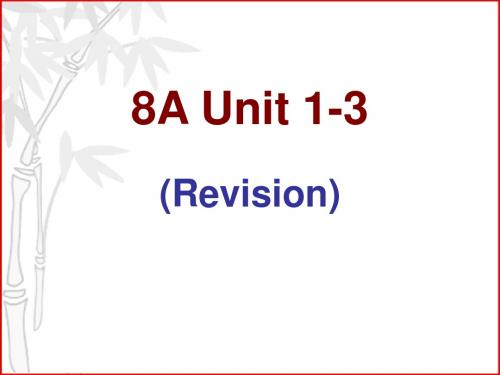
Unit 1-3 复习主要内容: 复习主要内容:
词汇 短语句型 词汇的表达和运用 语法项目 书面表达
词汇
四会词: 四会词 Unit 1
nothing, bowl, honest, secret, joy, problem, magazine, good-looking, slim, willing, ready, seat, singer, wonderful, almost, poor, eyesight, smart, bored, unhappy, joke, fit, knock, advertisement, true, thin, square, handsome, cheerful, than, height, test, dangerous, camping, activity, popular, solve, future, become, famous, agree, reader, nervous, airport, uncomfortable, lunchtime, advice, smiling, appearance, pleasant, ability, wear, climbing. (共53个) 共 个
arrived ________, they _______ at the World Park. Finally _________ is beautiful. They became very _______ Everything excited when they saw the Eiffel Tower! It is _______ of made metal. Kitty and Linda did feel _____ any _____. sick more enjoy They just wanted to go into the park and______ __________. The whole world was there in front of themselves them. There are _____ _____ a hundred places of more than interest _______. amazing It was an ________ day but the best part was the song and dance parade. The music was great and join in Kitty wanted to ______ ____ the dancing. Kitty’s taught ______ classmate Daniel _______ himself how to make a page home _____.
牛津译林英语8A教学计划含教学进度表
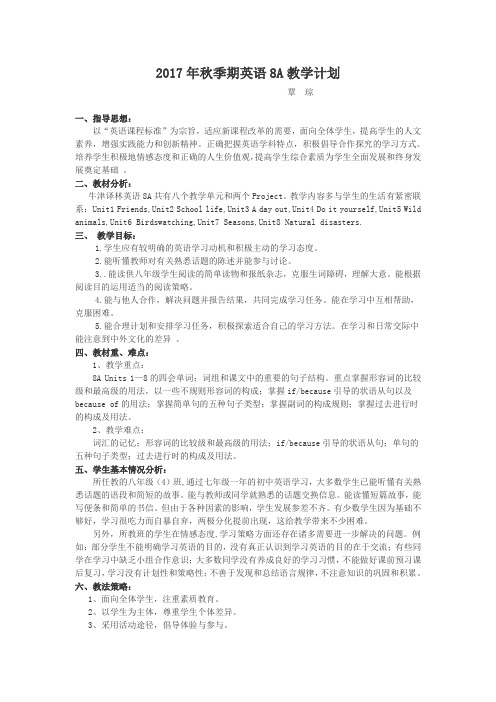
2017年秋季期英语8A教学计划覃琼一、指导思想:以“英语课程标准”为宗旨,适应新课程改革的需要,面向全体学生,提高学生的人文素养,增强实践能力和创新精神。
正确把握英语学科特点,积极倡导合作探究的学习方式。
培养学生积极地情感态度和正确的人生价值观,提高学生综合素质为学生全面发展和终身发展奠定基础。
二、教材分析:牛津译林英语8A共有八个教学单元和两个Project。
教学内容多与学生的生活有紧密联系:Unit1 Friends,Unit2 School life,Unit3 A day out,Unit4 Do it yourself,Unit5 Wild animals,Unit6 Birdswatching,Unit7 Seasons,Unit8 Natural disasters.三、教学目标:1.学生应有较明确的英语学习动机和积极主动的学习态度。
2.能听懂教师对有关熟悉话题的陈述并能参与讨论。
3..能读供八年级学生阅读的简单读物和报纸杂志,克服生词障碍,理解大意。
能根据阅读目的运用适当的阅读策略。
4.能与他人合作,解决问题并报告结果,共同完成学习任务。
能在学习中互相帮助,克服困难。
5.能合理计划和安排学习任务,积极探索适合自己的学习方法。
在学习和日常交际中能注意到中外文化的差异。
四、教材重、难点:1、教学重点:8A Units 1—8的四会单词;词组和课文中的重要的句子结构。
重点掌握形容词的比较级和最高级的用法,以一些不规则形容词的构成;掌握if/because引导的状语从句以及because of的用法;掌握简单句的五种句子类型;掌握副词的构成规则;掌握过去进行时的构成及用法。
2、教学难点:词汇的记忆;形容词的比较级和最高级的用法;if/because引导的状语从句;单句的五种句子类型;过去进行时的构成及用法。
五、学生基本情况分析:所任教的八年级(4)班,通过七年级一年的初中英语学习,大多数学生已能听懂有关熟悉话题的语段和简短的故事。
译林牛津版8a Unit 3 Revision 教学课件 (共18张PPT)

1. 2. 3. 4. 5. 6. 7. 8. 9. 10. 11. 12. 13. 14. 15. 16. 17. 18.
take a boat trip 乘船旅行 经过 go past 邀请我参加他们学校的旅行 invite me to join their school trip 起初,开始 at the beginning 上/下长途汽车 get on / off a coach a lot of traffic 许多交通车辆 到达 arrive at / in 由---制成 be made of 感到不舒服,恶心 feel sick 不再--- 再也不--not---any more 一所有大花园的房子 a house with a big garden 名胜古迹 places of interest all over the world 遍及全世界 song and dance parade 歌舞游行 teach oneself to do sth = learn to do sth by oneself 自学做某事 go horse riding 骑马 在你的支持下 with your support as soon as possible 尽可能快的
7.You can feel the beauty ______ (beautiful) of old city --Yangzhou. onders 8.The Great Wall is one of the eight w_____ on the earth. 9.The climbers _______ (climb) are climbing the hills. 10.______ Luckily (luck), I passed the exam. 11.______ Finally (final), we got to the top of Eiffel Tower. 12.At last , we won ____ the match.We were the winners _____ . (win) 13.At the end of the match, the winners received ______ (接 受)the cup and medals. 14.He did worse ______ (badly) than me in the match.
8A Unit3 Revision
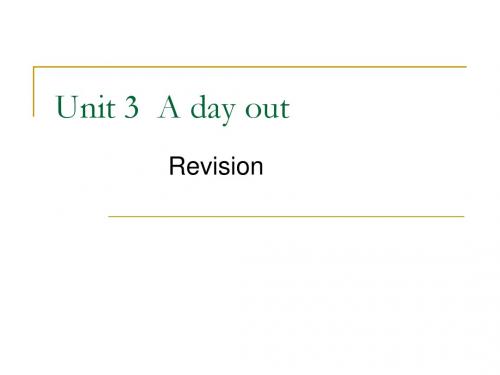
get on a coach take about 2 hours on the city road on the highway feel sick
arrive at
get off not … any more enjoy oneself
become excited
be made of
be inside over a hundred places of interest pyramids the Golden Gate Bridge the song and dance Parade
take a plane to go to… by plane
fly to …
A: Where do you want to go in Beijing? B: How can you go to Beijing?
go to Beijing by train/plane/coach take a plane/coach to Beijing take the train to Beijing
Verbs bore excite amaze interest frighten surprise …
Adj.
Adj.
boring exciting amazing interesting frightening surprising
bored excited amazed interested frightened surprised
highway
etal 1.The Eiffel Tower is made of m__________. ky 2.There are some kites flying in the s_________. 3.I’d like to i_________ my friends to my party. nvite 4. Take a look at the things people used (use) in the past. 5.You can climb u p the Great Wall and look at the amazing v iew . 6. The cost of the trip is ¥10 p__ person. er 7. The World Cup F__ _ is exciting every time. inal eceived 8. Mr Wu r_______ many presents on Teachers’ Day last year.
牛津译林版课件:8A Unit8 Revision (共31张)
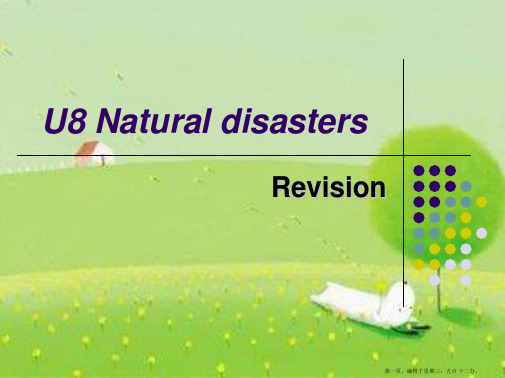
Lightning hit a classroom building and it caught fire.
3. 我听到一声像雷声一样的巨响。 I heard a loud noise like thunder.
4. 当人们四散逃跑的时候玻璃片和砖头正在往下掉。 people were running in all directions while pieces of glass and
strangers. She speaks and behaves __n_a_t_u_ra_ll_y___. It is a good habit to eat__n_a_tu_r_a_l _ food.
第十页,编辑于星期三:五点 十二分。
cover with; be covered with
2) the whole day/morning, from 8 to 10 p.m. last night .…
第十六页,编辑于星期三:五点 十二分。
Grammar ---Past continuous tense
Past continuous tense v.s. Simple past tense
过去进行时着重描述当时正在进行的动作, 它的特点是:未完成,强调过程;
一般过去时表示一个已经完成的动作,表示 动作发生过,而且已经结束了,强调结果。
第十七页,编辑于星期三:五点 十二分。
Grammar
---Past continuous tense
What __w__e_re____you __d_o__in_g_(do) at this time yesterday.
12.由于天气太冷,我爸爸的车坏了。
8a unit 1 Revision

6.不规则的变化:
1.A + be/linking verb + adj.(比较级) + than B. A比B更„„ 2. A + be/linking verb + the +adj.(最高 级)+ of / in….在„„范围内,A 最„„
3.as…as
和… …一样
4. not as (so) … as 和… … 不一样
( D )9.We often hear him____this song. A.sings B.singing C.to sing D.sing
big bigger
biggest
The first kite is good. The second kite is __________ the first one. better than
good/well bad/ill many/much little
comparative superlative
better worse more less farther further best worst most least farthest furthest
far
The rules : 1.两者比较用 比较级 ,常与 than 连用;
5.Which is ________(far), this one or that one? farther
6.Who is _________(good) at English ,you better or he? the largest 7.Shanghai is one of _________ (large) cities in the world. 8.Which of the twins is________(thin)? thinner
- 1、下载文档前请自行甄别文档内容的完整性,平台不提供额外的编辑、内容补充、找答案等附加服务。
- 2、"仅部分预览"的文档,不可在线预览部分如存在完整性等问题,可反馈申请退款(可完整预览的文档不适用该条件!)。
- 3、如文档侵犯您的权益,请联系客服反馈,我们会尽快为您处理(人工客服工作时间:9:00-18:30)。
Revision for Chapter 3
I.Choice
( )1. After hearing the bell, everyone hurried ________.
A. go on
B. went on
C. broad
D. aboard
( )2. Be ____. Can’t you see all the students are reading in the library ______.
A. quiet, quiet
B. quietly, quiet
C. quiet, quietly
D. quietly, quietly ( )3. There are many highrises on ______ side of Huaihai Road.
A. either
B. neither
C. both
D. all
( )4. The thief _____ his bag and showed everyone around him that the bag was empty.
A. hold out
B. hold up
C. held to
D. held out
( )5. Bob spends a lot of money on books _______ he is not rich.
A. though
B. if
C. when
D. because
( )6. Yesterday I got up early ______ be late for the exam.
A. in order to
B. in order to not
C. so as not to
D. so as to
( )7. How long have you _______ Beijing?
A. been in
B. been to
C. been on
D. gone to
( )8. _____ is exciting for the children to have a picnic on the top of the hill.
A. That
B. It
C. This
D. There
( )9. Tom gets up early every day ____ Saturday and Sunday , because he needn’t go to school.
A. without
B. except
C. beside
D. besides
( )10. All the windows should be kept ______ after school.
A. open
B. to open
C. closed
D. close
( )11. ---What are you doing ? ---- I am working ______ the maths problem.
A. out
B. about
C. on
D. for
( )12. She took it without permission from Mary’s home yesterday.
A. stole it
B. robbed it
C. fetch
D. bought it.
( )13. Could you tell me how much it ____ to fly to Beijing from Wuhan?
A. spends
B. pays
C. costs
D. changes
( )14. I haven’t decided which hotel ______.
A. to stay
B. we would stay
C. to stay at
D. was to stay at
II. Fill in the blanks with the given words in their proper forms:
1.The Great Pyramids were built by the _____________. (Egypt)
2.We can’t see clearly in the __________ ( dark)
3.The decision of giving up those lying patients _______ everyone at the meeting
that day. ( surprise)
4.There was a big _________ between us yesterday. ( argue)
5.We need three more __________ for this shop. ( assist)
6.Let’s answer the ____________ questions quickly. ( follow)
III. Rewrite the sentences as required:
1.They could hardly believe the news. ( tag question )
They could hardly believe the news , _________ ________?
2.Open the window , will you ? ( closest in meaning)
_______ you _____ opening the window?
3.You can’t get a taxi in such a heavy rain. ( closest in meaning)
4.It ____ __________ to get a taxi in such a heavy rain.
5.He went to the hospital to have a checkup on eyesight.
______ ________ he go to the hospital?
IV. Cloze text:
B
It’s very interesting to study names of different countries. Chinese names are different __1__ foreign names. Once an English lady came to __2__ me. When I was introduced to her, she said, “Glad to meet you, Miss Ping.” Then she gave me her name card with three words on it: “Betty J. Black.” So I said “ Thank you, Miss Betty.” We looked at each other and laughed hearti ly(会意地). Later I found that the English people __3__ their family names last and the given name __4__, while their middle names are ___5__ used very much. I explained to her that the Chinese family name __6__ first, the given name last, so he __7__ never call me Miss Ping. She asked if we Chinese had a middle name. I told her we didn’t. __8__ people may often find three words on a Chinese name card. In this case the family name still comes first, the other words after it __9__ a two-word given name. It is quite usual in China. My sister is Li Xiaofang. She has two words in her given name instead of just one __10__ mine.
1.A. with B. from C. for D. in 2。
A. find B. look at C. visit D. meet 3.A. put B. placed C. took D. brought 4。
A. at the first B. at first C. in the front D. first
5.A. never B. not C . / D. often 6。
A. came B. comes C. put D. puts 7.A. would B. could C. should D. must 8。
A. But B. Or C. While D. And 9.A. is B. was C. are D. were 10。
A. as B. with C. to D. like。
